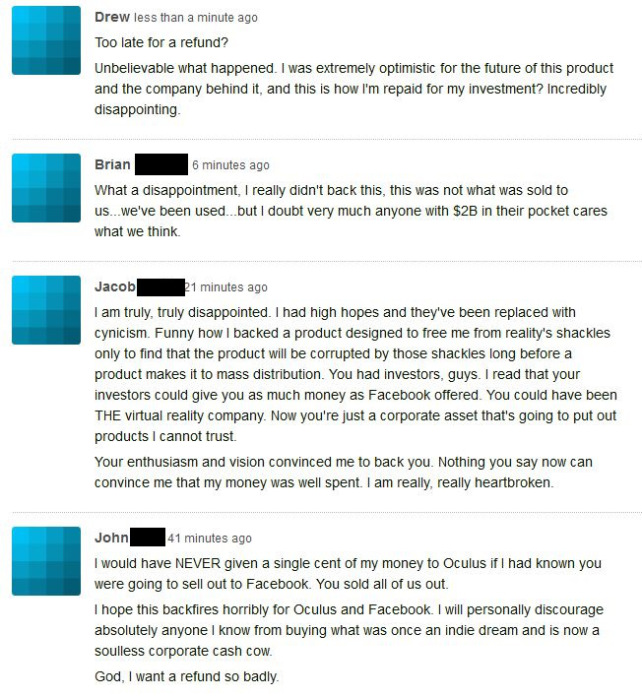
$400 million in cash plus $1.6 billion in stock ─ the price Facebook is paying to acquire Oculus, maker of the Rift VR googles ─ is synonymous with bribery. Oculus’ hallmark phrase “Designed for gamers, by gamers,” no longer holds true when the primary shareholder is the biggest social media and information dealer in the world, whose idea of a game is shovelware such as Farmville.
Hyperbole aside, it’s a well-known fact that all Kickstarter campaigns bear a certain degree of risk of failure, nevertheless, the Rift’s campaign succeeded by raising $2,437,430, equivalent to 975% of their proposed funding goal. This is money received in exchange for a promise, for a particular product that was altered at the last minute. Moreover, If not for the Kickstarter-generated hype, Oculus would not have acquired the subsequent $14,000,000 from venture capitalists. So the question to ponder is: would the original Oculus Rift campaign have even thrived if it was proposed by Facebook rather than an independent studio? There’s no pleasant way of saying it, but alienating your primary audience is selling out.
The reactionary comments we see on Oculus’ Kickstarter page echo these sentiments.


Why would Facebook buy a video game-related company? Similar to how Google diversified its investments by expanding beyond the initial search engine, Facebook, too, is attempting to grow its portfolio through its acquisitions of other tech firms. The company is aware that social media platforms are governed by trends, and trends are volatile and unsuitable for long term investments.
For Facebook to survive, it must constantly innovate. And what’s more innovating than cutting-edge virtual reality? Oculus’ Rift was heralded as a big step forward in pioneering the framework for virtual reality in a manner that is unique enough to create a different experience, far surpassing the kitschy attempts of previous decades. We’re nowhere near true virtual reality, but computer generated images have reached nearly life-like proportions where the suspense of disbelief comes more naturally, and more easily. Facebook sees the potential of applying this technology into the communication medium.
The deal is too nascent to speculate whether Oculus’ original vision will be distorted by an overbearing Facebook or if the studio can now leverage the new resources to broaden its scale. Palmer Luckey, founder of Oculus, hosted a recent “Ask me anything,” AMA, on Reddit, attempting to clarify the executive chain of thought that went into this decision, otherwise known as “damage control” in this instance. He explained that Oculus needs far more cash and scale in order to deliver a Rift that’s as spectacular as planned.
“we can make custom hardware, not rely on the scraps of the mobile phone
industry. That is insanely expensive, think hundreds of millions of dollars. We
can afford to hire everyone we need, the best people that fit into our culture
of excellence in all aspects.[and] We can make huge investments in content.”
Luckey believes that Facebook will give Oculus infrastructure, capital, and other resources in return for a financial stake, “we have even more freedom than we had under our investment partners because Facebook is making a long term play on the success of VR.” If Facebook’s handling of Instagram and Whatsapp is an indication of autonomy, then Oculus may still deliver the gaming platform it promised ─ hopefully without the invasiveness of Facebook.
The perspective of 4Chan's /v/ sub-forum is a tad more pessimistic.



Advertisement
Learn more about Electronic Products Magazine






